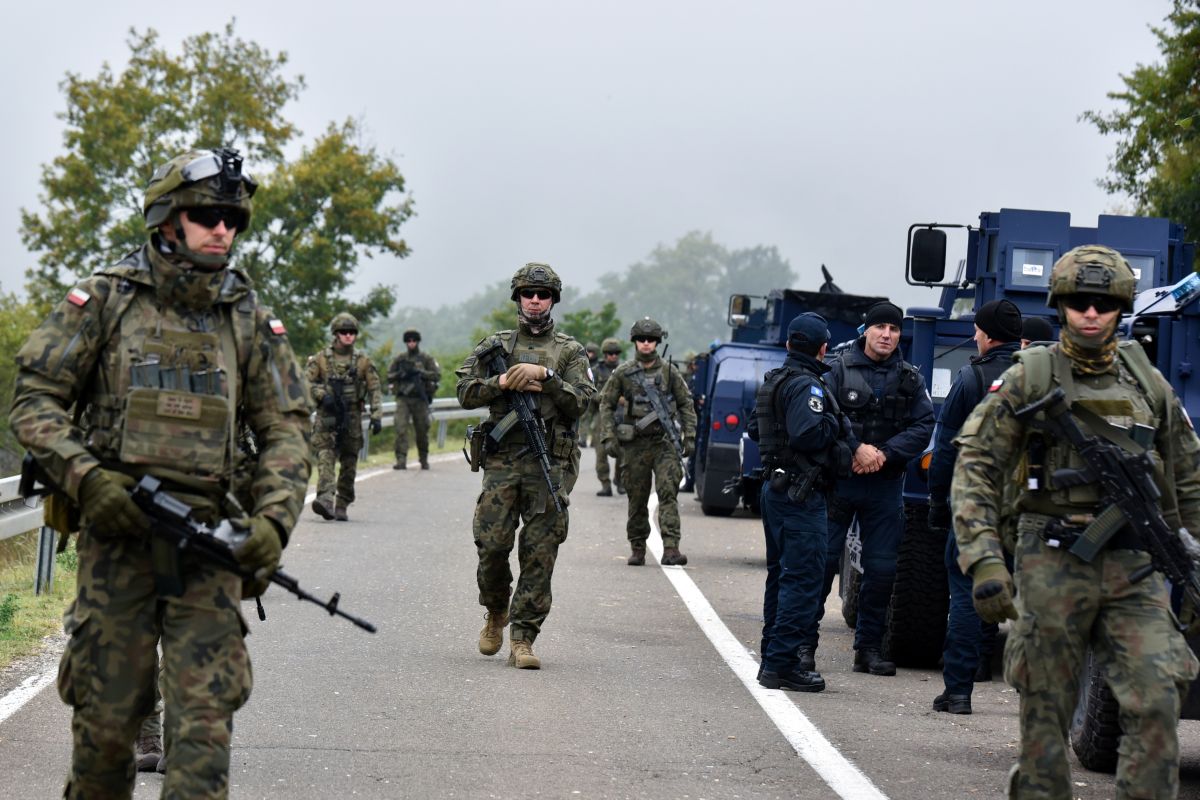The Future of NATO Crisis-Response Operations: Lessons from Kosovo
The September incidents on the Kosovo-Serbia border, which ended with an effective NATO and EU response, show that developing cooperation with partners is crucial to the effectiveness of the Alliance’s involvement in stabilisation operations. The experiences and lessons from the NATO KFOR mission should influence the discussion on the role of crisis-response operations in the Alliance’s future strategy. The chaotic end of the mission in Afghanistan undermined the image of NATO as an organisation capable of conducting effective non-Article 5 operations. KFOR has, however, demonstrated that the Alliance can act effectively in cooperation with the EU.
 Fot.LAURA HASANI/Reuters/FORUM
Fot.LAURA HASANI/Reuters/FORUM
In September the crisis on the Serbian-Kosovo border over new Serbian number plate regulations introduced by the Kosovo government led to protests by the Serbian community in the north of the country. About 200 protesters blocked border crossings with Serbia and attacked offices issuing the temporary markings. The Kosovo authorities deployed special police units to the border regions, to which Serbia responded by putting military units in the south of the country on combat alert and sending fighter jets, helicopters, and armoured vehicles to patrol the border. Further escalation was prevented by the actions of NATO forces and the involvement of EU diplomacy. KFOR increased the number and intensity of patrols and strengthened border control while the EU Special Envoy for the Western Balkans negotiated an agreement that temporarily defused the dispute and calmed the situation.
EU and NATO Cooperation in Kosovo
KFOR, established in 1999, is NATO’s largest mission with about 3,700 soldiers, including 247 Poles, participating in it. Its tasks concentrate on ensuring security, monitoring the situation, and preventing an escalation of tensions, as well as protecting the border, combating contraband, and responding to crises. KFOR troops conduct joint patrols with the Kosovo police and support local authorities in ensuring public order. The NATO Liaison and Advisory Team to the Kosovo Ministry of Defence is responsible for security sector reform and oversees the professionalisation of the Kosovo Security Forces (KSF). Since 2008. KFOR has been cooperating closely and effectively with the EU’s civilian mission EULEX in, among other things, providing security for its officers, among whom are 105 Polish police.
The launch of the EULEX mission, which de facto took over the role of the UN mission (UNMIK), relieved NATO of the burden of supporting the local authorities in ensuring public order and made it possible to reduce the size of the KFOR forces (in 1999, it was 50,000; in 2003, 17,500; in 2008, 14,000). However, cooperation between EULEX officers and KFOR soldiers was initially difficult because the EU and NATO do not have formal (i.e., functioning on a political level) mechanisms of cooperation between their missions and operations, even on the same territory. In particular, the exchange of sensitive information (e.g., on threats, plans, etc.), which is essential for the coordination of work, is hampered by the so-called double veto—NATO intelligence sharing with non-NATO EU members is opposed by Turkey, and in the EU, by Cyprus.
For this reason, communication and meetings at an informal level (including at the level of the head of EULEX and the KFOR commander) have developed. Representatives of NATO structures also attend meetings of the EU’s Political and Security Committee (PSC), and the head of the EU’s Crisis Management and Planning Directorate (CMPD) attends meetings of the North Atlantic Council (NAC). Exchange of information at the level of the foreign and defence ministries of the countries involved in the missions, cooperation of officers in NATO commands (SHAPE, JFC Naples) with the European External Action Service (EEAS), and daily contacts between KFOR and EULEX personnel are also common practice.
Cooperation on the ground is also defined in technical agreements concluded at the level of the EULEX and KFOR heads of mission. According to these, KFOR is the third response force after the local police and EU police units. Communication and coordination between them takes place through liaison officers, contact points, and regular meetings. Contacts between EULEX regional advisors and KFOR Liaison and Monitoring Teams also provide an opportunity for information exchange. The local police and EULEX keep NATO informed of operational activities (e.g., patrols, arrests, or police actions), for example, but this rarely happens the other way round due to political constraints.
The interaction with the Kosovo police and EULEX has forced KFOR to adapt the training of soldiers to perform tasks of a police nature (e.g. crowd/riot control). This cooperation has led to increased civil-military interoperability and the development of solutions to facilitate cooperation at the operational and tactical level, for example, in riot response, military support to police operations, or personnel evacuation. However, due to political constraints, the EU and NATO do not conduct joint operational planning for EULEX and KFOR, nor joint threat assessment.
Impact of the Kosovo Mission on NATO’s Future Strategy
The lessons from Kosovo are crucial for NATO-EU cooperation in the area of crisis management and may influence the debate on the Alliance’s future strategy. Since the annexation of Crimea, NATO’s adaptation has focused on restoring its deterrence and defence capabilities towards Russia and adapting to new threats (e.g., innovative technologies) and challenges from China. The future of non-Article 5 missions, which are important NATO tasks, will be reluctantly discussed and may be dominated by a critical assessment of the effects of the 20-year engagement in Afghanistan. However, some countries emphasise the need to maintain and even develop the ability to stabilise the Alliance’s neighbourhood and build the capacity of partners to provide security themselves. This is due to the different threat perceptions of the member states –this is a priority for the states on the Southern Flank, exposed to the effects of conflicts and instability in Africa and the Middle East. Therefore, in order to maintain crisis-response capabilities, NATO will strengthen cooperation with regional partners (especially the EU).
The involvement of NATO and the EU in the de-escalation of another crisis in the north of Kosovo (previous ones took place in 2004, 2008, 2011-2013) has confirmed the effectiveness of the technical cooperation mechanisms developed, which are sectoral and complementary in nature. Thanks to NATO’s deterrent military presence, the risk of military threats in Kosovo is low. EULEX in turn supports local authorities in maintaining public security and the rule of law, relieving NATO of this kind of burden. The EU is also responsible for the political process, that is, working towards the normalisation of Kosovo’s relations with Serbia.
Through its cooperation with the EU, the Alliance has reduced the number of personnel and thus lowered the costs of its involvement in the stabilisation of Kosovo. However, the experience of the KFOR mission illustrates the systemic weaknesses of NATO-EU cooperation (especially in terms of the difficult exchange of information caused by the “double veto”). Political constraints have been overcome through ad hoc and informal solutions at the strategic, operational, and tactical levels that can be applied to future missions. These point to directions for further enhancing EU-NATO cooperation in the context of the third Joint Declaration of the two organisations, currently under development and due to be adopted in early 2022 (the previous ones in 2016 and 2018 set out a list of 74 joint actions in the area of security and defence). In particular, it promises to strengthen the political dialogue between the NAC and the PSC, formal and informal contacts between NATO and EU personnel, and operational cooperation and information sharing. However, growing disputes between Turkey and other states, including Cyprus, Greece, and France, may hamper work in this area.
Conclusions for Poland
Increasing NATO-EU cooperation in the field of crisis-management missions is beneficial for Poland, as it may contribute to focusing the Alliance’s work on collective defence. Poland can use NATO’s (and the EU’s) experience in Kosovo both in the debate on NATO’s future strategy and in the work on the EU’s Strategic Compass. It is in Poland’s particular interest that the crisis-management instruments included in both documents are not exclusively oriented towards countering threats in the southern transatlantic area, but equally take into account the specifics of Eastern Europe and the Western Balkans.


